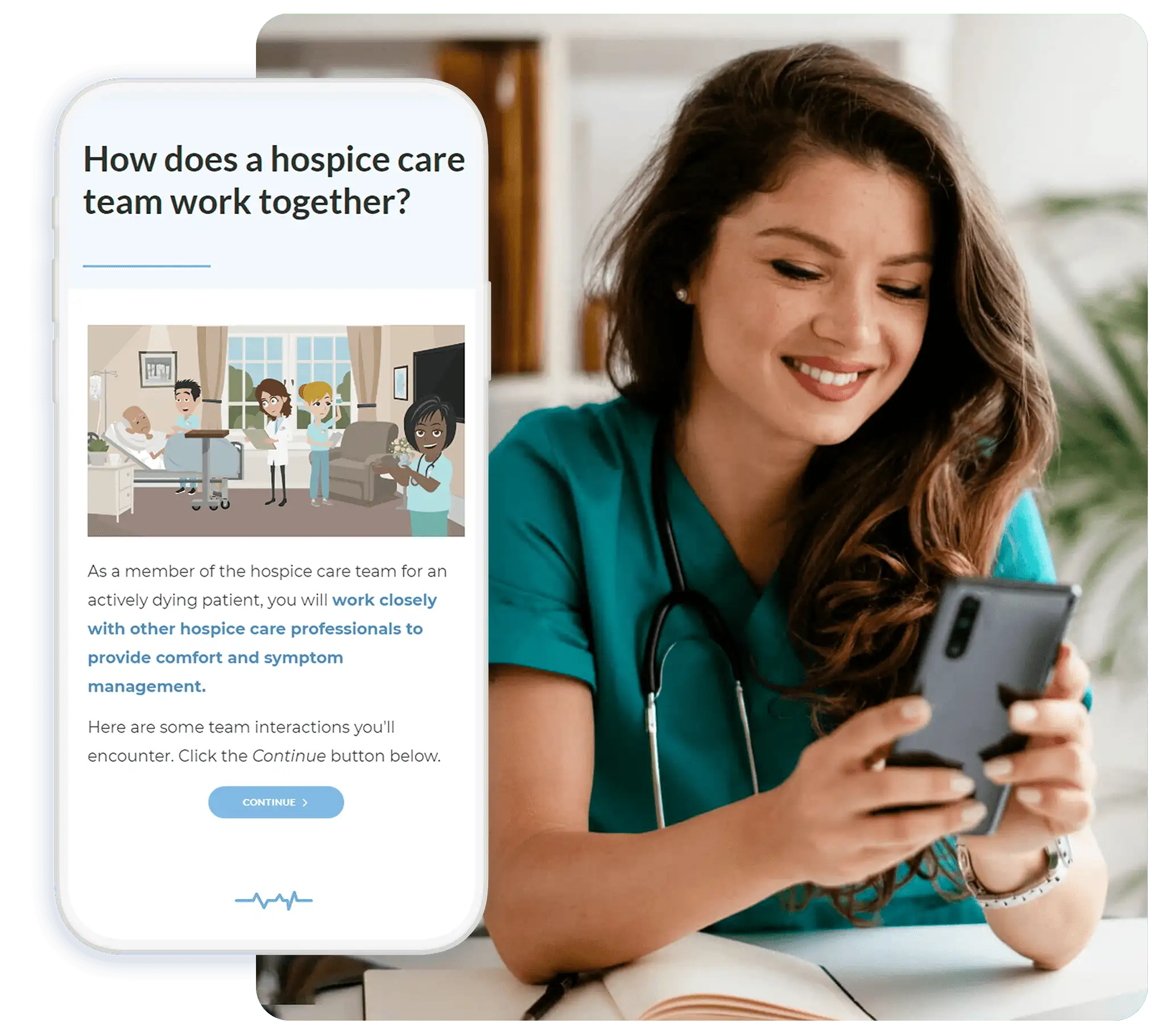Guidelines for Florida’s HIV/AIDS Laws
Introduction
In 1998, the Florida Legislature adopted the Omnibus AIDS Act to help manage the complex legal and social challenges of HIV disease. Florida laws regarding HIV/AIDS direct health care workers and our agency in relation to testing, confidentiality, and access to treatment. The Department of Health also has certain rules about reporting positive test results.

CONTINUA LEARNING
Simplify Your Hospice Team’s Training and Skill Building
A complete solution for your agency: more than 125 hospice courses, caregiver in-services, training plans, and more.
Testing
The following rules apply to testing:
- Testing must be informed, voluntary, and confidential.
- The age, mental capacity, and language skills of the subject must be taken into consideration when explaining HIV testing.
- To be considered informed consent, basic information must be provided about HIV testing and consent must be documented.
- Minors in Florida (unemancipated children under the age of 18) are adults for the purposes of consenting to an HIV test. The general rule that parental consent is required prior to medical diagnosis or treatment of a minor does not apply when sexually transmitted diseases (STDs) such as HIV infection are involved. Florida specifically forbids parents the fact of the minor’s HIV test or its results either directly or indirectly (such as by billing a parent without the child’s permission).
- Having obtained consent, physicians and other health care professionals must provide specified information about the test
- Test results must be provided face-to-face (not delivered by telephone or mail), with simultaneous post-test counseling (which must be client centered) about the meaning of the results, any further testing, measures for preventing transmission of HIV, location and availability of health care, social and support services, benefits of locating and counseling co-infected individuals, and the availability of public-health services.
- HIV testing without informed consent can result in discipline by a licensing board, fines, and civil liability for negligence and invasion of privacy. However, testing without consent may be done in specified circumstances such as bona fide medical emergencies, cases of therapeutic privilege (when obtaining consent would be detrimental to the patient’s health), when a person is charged with sexual offenses (requires a court order), in specialty areas (blood and tissue banks), for hospitalized infants who need testing but parents cannot be found, and on court order. The state’s law also permits HIV testing of prostitutes without informed consent as well as in certain medical examiner’s cases.
- Every physician or midwife attending to females for conditions related to pregnancy during the period of gestation or delivery is required to offer an HIV test with counseling on the availability of treatment if the test is positive. If the pregnant woman refuses testing, written documentation of refusal signed by the patient should be included in the medical record.
- Persons who are HIV-antibody positive should be instructed in how to notify their partners and to refer them for counseling and testing. If they are unwilling to notify their partners or if it cannot be assured that their partners will seek counseling, physicians or health department personnel can assist with confidential procedures to assure that the partners are notified.
For further information on reportable and non-reportable testing results, contact our county public health department.
Confidentiality
By law, medical records are confidential and information about HIV testing, the results of testing or the identification of the person tested is considered “super confidential.” Disclosure is strictly limited to the following individuals and/or categories of individuals:
- The test subject or legal representative; also, adoptive and foster parents.
- Those designated in a specific and legally effective release signed by the subject.
- Health care providers consulting among themselves or with health care facilities to determine the diagnosis and treatment of the subject.
- The Department of Health and Rehabilitative Services (HRS) in the reporting of AIDS cases.
- Health care providers or health facilities that procure, possess, distribute, or use human body parts or semen.
- Health-facility staff committees for conducting program monitoring, program evaluation, or service reviews.
- Authorized medical or epidemiologic researchers.
- People authorized by court order. (A general subpoena for medical records is insufficient.)
- Those employees who either provide care to the test subject, conduct administrative tasks in support of the patient’s care, or handle bodily fluids or tissues of a test subject and have a “need to know”. (Most nurses fall into this category.)
There are serious consequences for breaches of confidentiality. The provider who releases test results without permission is subject to disciplinary action and may be sued for negligence and invasion of privacy as well. It is a first degree misdemeanor (subject to up to one year of imprisonment) to violate confidentiality requirements even if the violation is not intentional. It is a third degree felony (which carries a punishment of up to five years imprisonment) for any person maliciously or for monetary gain to give out information identifying an individual with a sexually transmitted disease, including HIV (Florida Omnibus AIDS Act, 1998).
Access to Treatment
It is illegal for licensed providers to require an HIV test in order to treat patients or admit them into a facility. Discrimination against suspected HIV positive individuals or HIV infected persons is a violation of the Florida Omnibus AIDS Act.
Health Care Workers with HIV
In 1991 the US Congress issued a mandate that each state must certify and institute guidelines as required by the Centers for Disease Control and Prevention regarding health care workers who are HIV+ and participate in exposure-prone invasive procedures. In response, HRS published a document titled Florida Recommended Guidelines in Health Care Workers Infected With HIV and/or HBV.
If you found this article informative and useful share it with your friends and colleagues.
